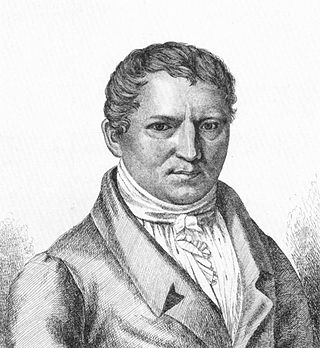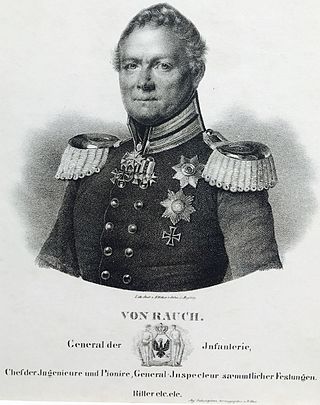 |
|---|
The below is a list of Ministers of the Ministry of Spiritual, Educational and Medical Affairs of Prussia who was often, unofficially, referred to as the Minister of Culture. [1]
 |
|---|
The below is a list of Ministers of the Ministry of Spiritual, Educational and Medical Affairs of Prussia who was often, unofficially, referred to as the Minister of Culture. [1]

The Minister of Spiritual, Educational and Medical Affairs was a Prussian minister in the State Ministry. The ministry was created in 1817 from the former department "for culture and public education" that existed from December 1808 to November 1817 in the Ministry of Interior. The term Minister of Culture was not used in official addresses but existed under various names and responsibilities until 1945. [1]
The first Minister was Karl vom Stein zum Altenstein who is known for reform of the Prussian educational system. [1]

Karl Friedrich Eichhorn was a German jurist.

Count Christian Günther von Bernstorff was a Danish and Prussian statesman and diplomat.

Baron Carl von Rokitansky was an Austrian physician, pathologist, humanist philosopher and liberal politician, founder of the Viennese School of Medicine of the 19th century. He was the founder of science-based diagnostics.

The Federal Ministry of Defence, abbreviated BMVg, is a top-level federal agency, headed by the Federal Minister of Defence as a member of the Cabinet of Germany. The ministry is headquartered at the Hardthöhe district in Bonn and has a second office in the Bendlerblock building in Berlin, which is occasionally used as a metonym to denote the entire Ministry.

The Prussian Union of Churches was a major Protestant church body which emerged in 1817 from a series of decrees by Frederick William III of Prussia that united both Lutheran and Reformed denominations in Prussia. Although not the first of its kind, the Prussian Union was the first to occur in a major German state.

The Free State of Prussia was one of the constituent states of Germany from 1918 to 1947. The successor to the Kingdom of Prussia after the defeat of the German Empire in World War I, it continued to be the dominant state in Germany during the Weimar Republic, as it had been during the empire, even though most of Germany's post-war territorial losses in Europe had come from its lands. It was home to the federal capital Berlin and had 62% of Germany's territory and 61% of its population. Prussia changed from the authoritarian state it had been in the past and became a parliamentary democracy under its 1920 constitution. During the Weimar period it was governed almost entirely by pro-democratic parties and proved more politically stable than the Republic itself. With only brief interruptions, the Social Democratic Party (SPD) provided the Minister President. Its Ministers of the Interior, also from the SPD, pushed republican reform of the administration and police, with the result that Prussia was considered a bulwark of democracy within the Weimar Republic.

The Royal Prussian Academy of Sciences was an academy established in Berlin, Germany on 11 July 1700, four years after the Prussian Academy of Arts, or "Arts Academy," to which "Berlin Academy" may also refer. In the 18th century, when French was the language of science and culture, it was a French-language institution.

The Prussian Academy of Arts was a state arts academy first established in Berlin, Brandenburg, in 1694/1696 by prince-elector Frederick III, in personal union Duke Frederick I of Prussia, and later king in Prussia.
The Prussian Cultural Heritage Foundation is a German federal government body that oversees 27 museums and cultural organizations in and around Berlin, Germany. Its purview includes all of Berlin's State Museums, the Berlin State Library, the Prussian Privy State Archives and a variety of institutes and research centers. As such, it is one of the largest cultural organizations in the world, and also the largest cultural employer in Germany with around 2,000 staff as of 2020. More than four million people visited its museums in 2019.
Heinrich Marx was a German lawyer who fathered the communist philosopher Karl Marx, as well as seven other children, including Louise Juta.

Hans-Joachim von Merkatz was a German politician. He was Federal Minister of Justice from 1956 to 1957. He was a member of the Bundestag from 1949 to 1961. He was a member of the German Party before joining the Christian Democrats in 1960.

Dietrich Heinrich Ludwig Freiherr von Ompteda was a Hanoverian jurist and government minister.

Johann Justus Georg Gustav von Rauch was a Prussian general of the infantry and Minister of War from 1837 to 1841.

The Kronprinzenpalais is a former Royal Prussian residence on Unter den Linden boulevard in the historic centre of Berlin. It was built in 1663 and renovated in 1857 according to plans by Heinrich Strack in Neoclassical style. From 1919 to 1937, it was home to the modern art collection of the National Gallery. Damaged during the Allied bombing in World War II, the Kronprinzenpalais was rebuilt from 1968 to 1970 by Richard Paulick as part of the Forum Fridericianum. In 1990, the German Reunification Treaty was signed in the listed building. Since then, it has been used for events and exhibitions.

Georg Heinrich Ludwig Nicolovius was a senior Prussian ministerial official whose responsibilities primarily encompassed church and school affairs.
Georg Thür, complete name Carl Georg Thür, was a German architect and Prussian official builder whose designs for university buildings had a decisive influence on the Prussian university landscape.

The Prussian State Ministry from 1808 to 1850 was the executive body of ministers, subordinate to the King of Prussia and, from 1850 to 1918, the overall ministry of the State of Prussia consisting of the individual ministers. In other German states, it corresponded to the state government or the senate of a free city.

The Ministry of Spiritual, Educational and Medical Affairs was a Prussian ministry that was created in 1817 from the former department "for culture and public education" that existed from December 1808 to November 1817 and was part of the Ministry of Interior. The term "Ministry of Culture" was not used in official addresses but existed under various names and responsibilities until 1945.

The Prussian State Council was an advisory body to the King in the Prussian State from 1817 to 1848 and reactivated in 1854, 1884, and 1895. Its members did not have the title of State Councilor, but were allowed to call themselves a Member of the State Council.